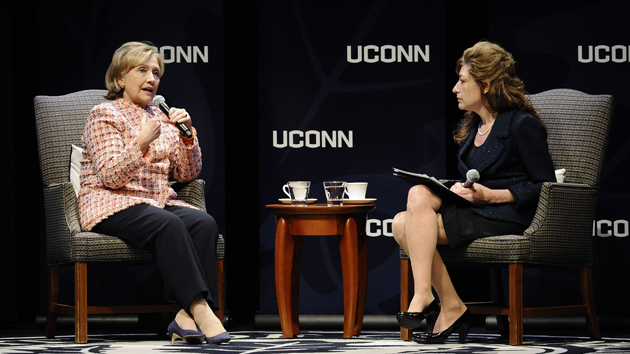Edward Snowden beamed into DC from Russia Wednesday afternoon to accept the Ridenhour Prize for “truth-telling,” speaking before a crowd at the National Press Club via a Google+ hangout. Snowden’s lawyer and his father sat at a table in the front row and accepted the award on his behalf.
“A year ago there was no way I could have imagined being here, being honored in this room,” Snowden said to open his remarks. “When I began this, I never expected to receive the level of support that I did from the public. Having seen what happened to the people that came before, specifically Thomas Drake, it was an intimidating thing.” Drake is a former high-level employee at the National Security Agency who was vigorously prosecuted after revealing waste and mismanagement at the agency. “I’d realized that the highest likelihood, the most likely outcome of returning this information to public hands would be that I would spend the rest of my life in prison,” Snowden said. “I did it because I thought it was the right thing to do.”
When asked what advice he would give to the next potential whistleblower who wants to expose wrongdoing in the intelligence community, Snowden said that there needed to be systematic changes; otherwise that whistleblower would be forced into exile like him. “Thomas Drake showed us that even if you’re a real classic [whistleblower revealing] waste, fraud, and abuse in a program… there’s a very good chance the FBI will kick in your door, pull you out of the shower naked at gunpoint in front of your family, and ruin your life,” he said. Instead, Snowden suggested that Congress needed to add safeguards to encourage people to come forward. “Work with Congress in advance to try to make sure that we have reformed laws,” he said, “that we have better protections, that all these shortcomings and failures in our oversight infrastructure are addressed so that the next time that we have an American whistleblower who has something that the public needs to know, they can go to their lawyer’s office instead of the airport. Right now I’m not sure they have a real alternative.”
Politicians, including Hillary Clinton, have criticized Snowden for fleeing the country. Snowden countered that he would have received no whistleblower protections had he remained in the United States. “I knew what would happen,” he said. “I knew that there were no whistleblower protections that would protect me from prosecution as a private contractor as opposed to a government civil, a direct government employee. But that didn’t change my calculus of what needed to be done.”
Snowden noted that he wasn’t alone among intelligence professionals worried about the massive amounts of data collected by the US government. The leaker said that he had frequent conversations with his colleagues about bringing the agency’s actions to public attention, but all were aware of the risks of exposing NSA activity.
“Do you think it’s right that the NSA is collecting more information about Americans in America than it is about Russians in Russia?” Snowden asked. “Because that’s what our systems do. We watch our own people more closely than we watch any other population in the world.” Snowden explained how he himself could have spied on any person, “from a federal judge to the president of the United States,” from his own desk, as long as he had an e-mail address or other digital identifier of the target. “When you make a purchase, when you buy a book. All of that is collected,” Snowden said. “I could see it at my desk, crossing my screen.”
At one point during Snowden’s appearance, an organizer of the event asked the audience not to record him—but this was near the end of his remarks, and numerous people in the audience were holding up smart phones and recording devices.













